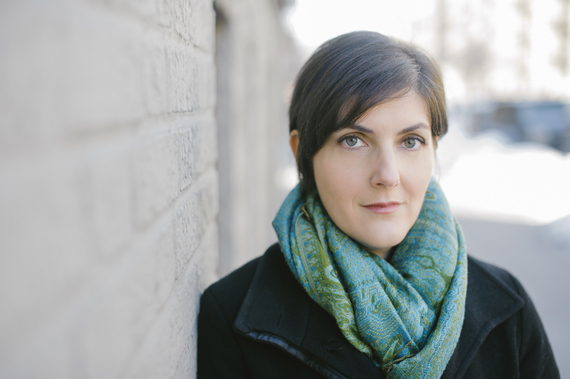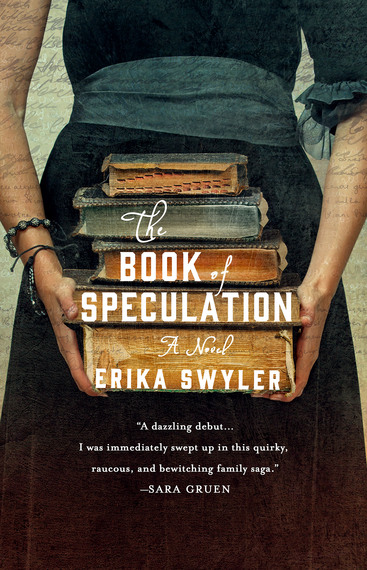
Erika Swyler's debut novel, The Book of Speculation, tells the story of a family haunted by their mother's past. As Simon learns more about his mother's life both inside and outside of the circus, he comes to view his family gifted with ability to hold their breath like sea creatures and see the past and future through the tarot to be both incredibly susceptible to death in the water and lacking insight into their own conditions. I spoke with Swlyer about the power of the circus, writing from a male voice, and the uncanny connections that drive our lives.
So many beautiful books feature the circus from Erin Morganstern's The Night Circus, Sarah Gruen's Water for Elephant's, and Geek Love by Katherine Dunn. What do you think pulls authors to the circus? What captivated you? Do you have any formative circus memories?
Circus appeals to writers' escapist hearts. We see ourselves in it. Books and circus share the same goals--to captivate, entertain, and to make people think. I think we're also drawn to the idea of the romance of travel, and the tightknit relationships that form between performers. They're made families, chosen families. Circus is such a beautiful art form, but it's also quite dangerous. It's impossible to keep a writer away from writing about dangerous beautiful things. I can't resist them. My first memory of circus is of the trapeze artists--again, beautiful and dangerous. The trust, the absolute confidence they had that their partners would catch them was stunning. Trapeze to me represents the highest level of trust you can have in another human being. I find that hopeful.
Given the mermaid's lineage woven through the novel, I wanted to ask why you choose Simon to decipher the tale? What does the male voice add to the telling?
It was really simple. In an early draft I narrated part of the book from Enola's point of view. It was unreadable. It was too frenetic to be sustainable and didn't make a cohesive narrative. She's far too close to the curse to have perspective. I needed a voice who was connected to the curse, but also felt they were outside it. By nature of being male, Simon sees himself as safe from a curse, which has so far only killed women. He also functions as a foil to Enola's chaotic nature. He's a quiet kind of character who can subtly lead a reader to strange places without questioning his choices until they're already in motion.
That said, I've been asked a staggering number of questions about why I wrote a male narrator. No one questions men if and when they write female protagonists. There's an interesting pushback happening now where people are asking why the majority of award-winning novels written by women either have male protagonists or are about men. I'd venture a small part of it is an assumption that it's more difficult for women to write male protagonists believably and therefore requires greater skill. It isn't and it doesn't. Incidentally, a feminist way to write a protagonist is to write the character the story demands--regardless of gender--and write that character as a whole person.
The book turns on an interesting number of inter-generational connections. Churchwarry asks near the end of the book "Have you ever wondered why you're drawn to certain people?" What do you think The Book of Speculation says about the nature of human connection? Have you ever experienced this level of uncanny partnering in your own life?
I'm using the concept of fate to describe a more elusive idea about people seeking what they lack. Churchwarry asks that question of his polar opposite, who he's drawn to because of history and because of the same traits that make him care for Simon. We're drawn people who tickle something within us that we either recognize or feel we're missing. When people link up it feels like fate, but it's more by design. We're always looking for people who make us feel more. Often that means people might circle around each other for years because they share interests. Values and interests are things that flow easily across generations.
Early in our dating life my husband and I shared a few uncanny moments. We were sitting on a beach when I pointed to a spot in Connecticut and mentioned I had a friend who lived there. He said he did as well. It was the same person. We were both friends with a boy who lived in a different state, and we'd met him under entirely different circumstances. There were other overlaps. We'd been just missing each other for years. It was only a matter of time before we met. Ultimately that's not fate, but who we are. We're people who could be that boy's friend.
The story of your submission of the manuscript to publishers is quiet compelling. It amazes me that you hand sewed the volumes from tea stained pages with your own drawings and sketches. What lead you to this labor of love? What reaction did this receive from editors?
It takes so much of your life to write a novel. If didn't put all of myself into showing how much I cared, how hard I was willing to work, I would have regretted it. I knew presenting a manuscript that way was a risk, and I'm certain some were tossed in a recycling bin. When you make any kind of art, you make it knowing that you may be the only person who sees values it. But I had to try. Editors are book people before anything else, and this is a book person's book. I hoped if someone connected with it as an art object it would help them connect more deeply to the story. That turned out to be a good instinct. Things moved quickly after the manuscripts went out. It was all done in under a week. I only spoke with two editors, both of whom were very enthusiastic. I'd been terrified, but those conversations confirmed I'd made a beautiful thing. From that point on it was a matter of which editor saw the same story I did. Hope Dellon was able to see the book I had written and the book I'd wanted to write.
Your novel and your work in publishing the book clearly demonstrates a love of physical books. What thoughts do you have about digital publishing? Do you see any way to create the same experience with pixels instead of pages?
My love of books and reading is cross platform and it always will be. I don't see print as being at war with digital. While physical books offer tactile pleasure and ask you to read with care, digital offers accessibility in a way people are far too quick to dismiss. Digital allows you to change print sizes, colors, contrast, text-to-speech, and to turn pages with a tap. For the visually impaired and anyone with fine motor difficulties, that means a level of independence that wasn't available before the last decade. To look down on advances like that is in some ways to deny people the gift of independent reading.
That said, we think of technology as disposable. Books are passed down, whereas e-readers are not. The book as an object is a bit like a horseshoe crab. It been perfectly suited to its purpose since its invention and hasn't needed to evolve. Technology is ever evolving. When we reach a stable point in reader technology perhaps people's readers will have soft edges, smell wonderful when you open them, and have small screens to capture an author's signature on an eBook cover, and places to leave notes for your family when you pass it down. Imagine a screen that could mimic the sensation of dog-earing a page. We're at a point when we can be nostalgic about our technology, but we're not yet at the point where our current technology can be a physical representation of history. When we get there, I'll happily sign everyone's readers.
The Book of Speculation is your first novel; when did you know you were a writer? What path did you take to reach this point in your career?
I'm always the last to know what I'm doing. I studied acting at NYU and somehow came out of it a playwright. I wasn't a good enough actor to make it. I've always written, but I had to try other things to find out what I should be doing. After giving up acting, I had to learn to write all over again. I started with short stories, took classes. I churned out an unreadable novel draft. And then another draft. And another. All the while I held down strange jobs, all of which I'm grateful for. Every bit of living is fodder. I submitted short stories everywhere, got rejected everywhere and was mostly miserable, but I kept plugging away. Eventually my agent noticed one of my short stories and reached out. I pitched the book and things grew from there. It sounds like a dream story, an overnight success sort of thing, but it wasn't. I'd been hanging around trying for years. Once you've decided that you're going to write, everything after is dogged perseverance. I'm aware that for the better part of a decade I looked to most people like wasted potential. Sometimes it takes that long to figure things out. Sometimes it's not wasted potential, it's just a really low boil.


